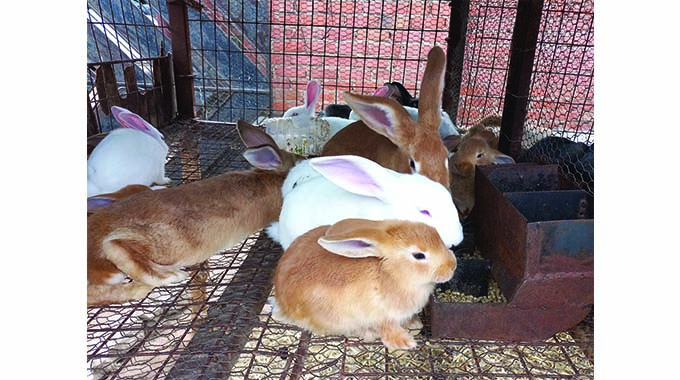Commercial rabbit producer trains farmers

Flora Fadzai Sibanda, Chronicle Reporter
Mr Trymore Nzou (34) ventured into rabbit farming as a hobby five years ago with only two rabbits, but today he is a successful commercial producer with over 200 of different breeds.
He keeps California, New Zealand White, New Zealand red, Angora, and the Chinchilla breeds at his rabbitry in Bulawayo’s Magwegwe North suburb.
The California and New Zealand White breeds are popular for their high meat-to-bone ratios.

Trymore Nzou rabbit breeder
Angora is one of the oldest domestic rabbit variety originating from Ankara, Turkey. The Angora is a variety, not a breed and, was mainly bred for its long and soft wool. It can grow up to 6kg.
The Chinchilla is often bred for meat production because of its quality. Since venturing into rabbit farming in 2018, life has never been the same for Mr Nzou.
Rabbit breeding has turned into a profitable commercial venture, which has enabled him to reinvest the proceeds in his business while meeting other financial obligations.
Mr Nzou said soon after acquiring the two rabbits, he started watching a YouTube series called “The Homestead” to learn more about commercial rabbit farming.

Upon realising that very few people in Bulawayo were practicing proper rabbit breeding, Mr Nzou started mass production of rabbits, with major focus on breeding.
With increased demand of rabbit meat due to its delicacy and nutritional value, individuals, restaurants and retail shops have turned out to be Mr Nzou’s clientele.
“One thing about rabbits is that they’re not easily prone to diseases, and if at all they develop diseases, then it should be attributed to improper feed management or improper maintenance of their shed. They develop minor diseases like ringworms, which makes it cheaper and easy to maintain,” he said.
Mr Nzou said rabbits’ health is highly dependent on how the farmer maintains their shed.
“If the shed is maintained unclean, the rabbits easily develop infections which result in lower growth rates. They also need a cage that will be self-cleaning so their cages have an opening underneath so their stool does not get stuck with them because they easily get sick if exposed to dirt and bad air circulation,” he said.
“Rabbit farming has large profit margins and rabbit output is consistent throughout the year because it is not a seasonal enterprise.”
Mr Nzou said the pace at which rabbits convert food is faster than that of other animals. In a year, they can breed six times depending on how they are fed.

Mr Nzou said the shelter for rabbits should be spacious as most of the animals that have started mating are not supposed to share a cage.
“Unlike the young ones, you cannot keep the older rabbits that have already started mating under one roof because they become territorial and fight such that they end up killing each other,” he said.
Mr Nzou said depending on the breed, a male rabbit can mate with a maximum of 10 females, kindling between eight and 15 rabbits in 30 days.
“The interesting part is that they take a maximum of 30 days to give birth and can be re-mate after two weeks while they are still in the lactation period. If mating is successful, we wean at six weeks so that the female rabbit can start preparing to give birth again,” he said.

“Unlike most animals, rabbits can be mated at any given time of the year as they have no stipulated time or season.”
In terms of value chain, Mr Nzou sells manure from his rabbits to horticulture farmers.
Rabbit urine is very rich in nitrogen, is very effective on vegetable crops like cabbage, lettuce, cucumber, watermelon, and other vegetables at any stage of growth. Other end products obtainable from rabbits such as fur and manure even make breeding rabbits more attractive to small-scale farmers.
Mr Nzou sells his breeders for US$50 while those for meat are going for US$7. The increase in rabbit meat demand is partly driven by health consciousness.

Rabbit meat is leaner and healthier and has higher protein, calorie, calcium, and vitamin content than any other animal flesh. Cholesterol, fat, and salt levels are lower than in other meats.
Mr Nzou has also started helping other up-coming farmers who want to get into commercial rabbit breeding.
“I have been teaching other people about rabbit keeping and last weekend I held a training workshop at a local school on rabbit keeping. In fact, l see a lot of potential in it and I believe it has the potential to be one of the best industries in the country,” he said. — @flora_sibanda












Comments